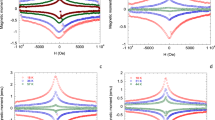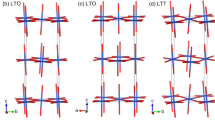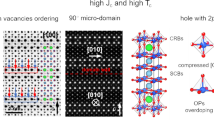Abstract
THE recent discovery of the electron-doped superconductors1 added fresh fuel to controversies about the mechanism of high-temperature superconductivity in copper oxide compounds. The superconducting transition temperature (Tc) of almost all the hole-doped copper oxide compounds increases with increasing pressure2. The pressure coefficient has a large positive value compared with a typical conventional (BCS) superconductor. A systematic survey of the TcS of Y–Ba–Cu–O and La–Sr–Cu–O compounds has shown that Tc is strongly correlated with hole concentration3–5, but the Hall coefficient is only weakly dependent on pressure6,7. These results indicate that the large change in Tc with pressure is caused, not by a change in hole concentration, but by other factors related to changes in the interatomic distances. Here we report that the newly discovered electron-doped superconductor Nd,1.85Ce0.15CuO4–δ exhibits almost no pressure effect on Tc up to 2.5 GPa, in remarkable contrast to the hole-doped superconductor Nd1.3Ce0.3Sr0.5CuO4–δ. The Cu–O pyramids characteristic of the hole-doped compounds lose their apical oxygens to become square planes in the electron-doped materials. If the pressure effect on Tc does arise from changes in bond lengths, the difference in behaviour of the two compounds points to the involvement of the bond between copper and apical oxygen, which is missing in the electron-doped material.
This is a preview of subscription content, access via your institution
Access options
Subscribe to this journal
Receive 51 print issues and online access
$199.00 per year
only $3.90 per issue
Buy this article
- Purchase on Springer Link
- Instant access to full article PDF
Prices may be subject to local taxes which are calculated during checkout
Similar content being viewed by others
References
Tokura, Y., Takagi, H. & Uchida, S. Nature 337, 345–347 (1989).
Griessen, R. Phys. Rev. B 36, 5284–5290 (1987).
Torrance, J. B. et al. Phys. Rev. lett. 61, 1127–1130 (1988).
Tokura, Y., Torrance, J. B., Huang, T. C. & Nazzal, A. I. Phys. Rev. B 38, 7156–7159 (1988).
Tokura, Y., Torrance, J. B., Nazzal, A. I., Takagi, H. & Uchida, S. in Mechanisms of High-Temperature Superconductivity (eds Kamimura, H. & Oshiyama, H.)(Springer, Berlin, in the press).
Parker, I. D. & Friend, R. H. J. Phys. C 21, L345–L352 (1988).
Tanahashi, N. et al. Jap. J. appl. Phys. Lett. (in the press).
Takagi, H., Uchida, S. & Tokura, Y. Phys. Rev. Lett. 62, 1197–1200 (1989).
Akimitsu, J., Suzuki, S., Watanabe, M. & Sawa, H. Jap. J. appl. Phys. 27, L1859–L1860 (1988).
Tokura, Y. et al. Phys. Rev. B (in the press).
Markert, J. T. et al. Physica C (in the press).
Neumeier, J. J., Maple, M. B. & Torikachvili, M. S. Physica C 156, 574–578 (1988).
Takahashi, H. et al. Jap. J. appl. Phys. Suppl. 26-3, 1109–1110 (1987).
Author information
Authors and Affiliations
Rights and permissions
About this article
Cite this article
Murayama, C., Môri, N., Yomo, S. et al. Anomalous absence of pressure effect on transition temperature in the electron-doped superconductor Nd1.85Ce0.15CuO4–δ. Nature 339, 293–294 (1989). https://doi.org/10.1038/339293a0
Received:
Accepted:
Issue Date:
DOI: https://doi.org/10.1038/339293a0
This article is cited by
-
Hydrostatic pressure: A very effective approach to significantly enhance critical current density in granular iron pnictide superconductors
Scientific Reports (2015)
-
Local structural instability of high-T c oxide superconductors studied by inelastic neutron scattering
Journal of Superconductivity (1994)
Comments
By submitting a comment you agree to abide by our Terms and Community Guidelines. If you find something abusive or that does not comply with our terms or guidelines please flag it as inappropriate.



